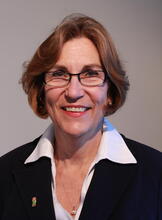We think it is important to highlight interesting stories, milestones and achievements of our alumni. If you have a suggestion for the spotlight, please let us know by email at stp.alumni@uwaterloo.ca
Hive Mind
a notional entity consisting of a large number of people who share their knowledge or opinions with one another, regarded as producing collective intelligence
 One thing we know to be true about the St. Paul’s alumni community is that you are generous with your time and resources. In this edition of the Hive Mind we asked Distinguished Alumnus Nancy McCalder (BA ’78), to share some insights about her establishment of a commercial donor advised fund – a form of strategic philanthropy which have been growing in popularity since arriving in Canada around 2002.
One thing we know to be true about the St. Paul’s alumni community is that you are generous with your time and resources. In this edition of the Hive Mind we asked Distinguished Alumnus Nancy McCalder (BA ’78), to share some insights about her establishment of a commercial donor advised fund – a form of strategic philanthropy which have been growing in popularity since arriving in Canada around 2002.
*Please note this is expressly for interest and informational purposes only and is not intended by Nancy or St. Paul’s to be seen as financial advice.
Q: Can you provide a little background about the McCalder Mental Wellness Foundation, including when you started it and how it works?
A: I started the foundation around the time I retired. We had been donors to many causes over the years and wanted to be a little more strategic with our giving after we retired. I was considering a named fund with the Edmonton Community Foundation or the United Way which were both good options. However, my financial advisor suggested setting up a donor advised fund through the TD Private Giving Foundation.
I made an upfront donation and got a tax receipt, then the Foundation invests the capital and notifies me each year how much is available for disbursement. I get to decide which charities to support and what percentage of the total amount goes to each and I get to contribute additional funds each year if I choose.
Q: Was there anything in particular that made you feel that a donor advised fund was right for you?
A: It worked for me because I didn’t have to worry about the investment or administration of the initial gift. I liked having control over where the donations go but also the flexibility to make changes each year if I choose.
I spent most of my career working in the non-profit sector so I was aware of how foundations worked. I knew that a private family foundation required a much larger initial investment and requires a lot more administration, with a board and everything. This way I get to enjoy some similar benefits without that added work. I also liked knowing that after ten years you can decide whether or not to continue, or transfer decision making authority to children or family members. It’s important to have that flexibility after retirement.
Q: Are there any pros and cons you can share?
A: There are many pros in my case. I get the peace of mind of knowing I have contributed to the causes I care about. It is nice to see exactly how much we are giving and to truly understand the impact of our giving. When we are asked to donate by other charities we can let them know we have completed our giving for the year. As I mentioned before, I like the simplicity and the flexibility. It is possible for others to donate to my fund if they give a minimum gift of $1,000. My mother was able to donate to both mine and my sister’s funds which helped with her estate plan by offsetting capital gains.
For some people they may not be able to afford the minimum initial donation of $10,000. A fund through a community foundation may work better since they often allow donors to establish their fund over a given number of years. Any additional gifts must be a minimum of $1,000 which may also be a deterrent for some.
Q: You specifically choose to support mental health and wellness, why is that?
A: I spent my career working in mental health. It was not a sexy cause; that seems to be changing but there are real needs that my donations can help solve. I like that I can maintain engagement with the organizations where I worked or for other charities I really care about, like St. Paul’s, through my philanthropy.
Q: Thank you for sharing this perspective with us Nancy, I am sure our readers will find this valuable. More importantly, thanks so much for supporting our work in residence life!
A: Thank you for the opportunity to share. Transition to university is not easy and can result in stress, anxiety and feelings of loneliness. I am so happy to know that St. Paul’s continues to make the mental wellbeing of students a priority and I am pleased to contribute in this way.
International Development Alumnus recognized by World Vision with the 2019 Ruth Roberts Award
 Cherie Wai (BES ’19) was recognized with World Vision Canada’s 2019 Ruth Roberts Award. This award is part of World Vision’s Hero’s for Children Awards, which celebrate individuals who have a heart for children and have demonstrated effort to make the world a better place, ‘especially’ for children. Cherie was recognized as a “bright young leader with an intense passion for the developing world”.
Cherie Wai (BES ’19) was recognized with World Vision Canada’s 2019 Ruth Roberts Award. This award is part of World Vision’s Hero’s for Children Awards, which celebrate individuals who have a heart for children and have demonstrated effort to make the world a better place, ‘especially’ for children. Cherie was recognized as a “bright young leader with an intense passion for the developing world”.
She was initially inspired by World Vision’s #LiveLikeAlex campaign to become an advocate for children and youth in poverty while she was still in high school. Alex Foto was a St. Paul’s International Development (INDEV) student who died as a result of a tragic accident between her first and second year of studies. Alex had devoted much of her young life to working for change through World Vision and Cherie decided to follow in her footsteps.
Cherie has been inspired to “live like Alex” ever since. She completed her degree in INDEV, and eventually became the President of the University of Waterloo’s World Vision Club, which Alex founded. Prior to departing for Bolivia to complete an 8-month overseas field placement, Cherie received the Alex Foto Memorial Award. This award recognizes students who care deeply about humanitarian work to participate in field placements in developing countries.
We caught up with Cherie, after hearing that she received the Ruth Roberts Award and we were glad to hear that she is still inspired to “Live like Alex”.
Cherie says “I owe this tremendous honour to all who've nurtured, inspired, and mentored me from World Vision to UW INDEV to STP and many more. And of course, Alex. I have no doubt she would be the one on stage if she were still with us today. I just passed by her memorial tree and remembered how my advocacy journey began with the inspiration I felt from her life-changing story. I live and achieve on her legacy.”
Cherie went on to say that she feels priviliged to advocate for children who are inherently resilient and wishes to acknowledge the heroic sacrifices made by World Vision staff who inspire her and the INDEV program for equipping her to be a development ally who works in solidarity. For Cherie, receiving the Ruth Roberts Award is not a reflection of personal achievement but a reflection of those she has the privilege to work with, to learn from and be inspired by.
Currently, Cherie works with at-risk children in inner-city Toronto as an intern with the Child Evangelism Fellowship of Ontario where she manages marketing and promotional operations. Cherie continues to have a passion to drive global change and will continue to inspire others to fight for social justice issues.












